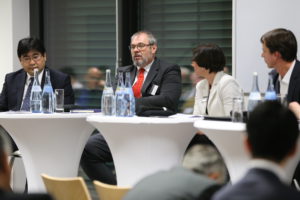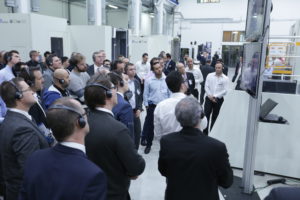What does the fourth wave of industrialisation mean to aerospace and die & mould companies? What is the future of unmanned operation? How can small companies navigate Industry 4.0 and prepare themselves for it?
These were just some of the questions that drove the International Aerospace and Die & Mould Forum hosted at the Makino Technology Centre in Kirchheim unter Teck, Germany, and attended by than 300 participants from across Europe.
The three-day event started on 24th January with the lunch-to-lunch Die & Mould session, focusing on the ‘Industry of Tomorrow’: an interesting mixture of exclusive expert presentations, panel discussions and live machine demonstrations with topics ranging from the current status quo in the industry and future insights to additive manufacturing and automation in sinker EDM.
In his keynote speech on ‘Die & Mould in Times of Industry 4.0 – Technology and Organisation’, Dr Kristian Arntz from the WBA Tooling Academy in Aachen pointed out that “the increasing demand for complex and multi-variant products at low cost and within short delivery times is forcing industrial enterprises to implement highly flexible and networked production.”
Automation and industry 4.0
On both days there were interactive panel discussions moderated by Susanne Schröder, editor-in-chief, Form+Werkzeug, and focussing mainly on the subject of automation and industry 4.0.
The topic that invited a lot of interaction was the declining availability of skilled operators in the manufacturing sector and its future implications. Panellists like Dr Wolfgang Leonhardt, CEO, Leonhardt Graveurbetrieb, pointed out that one of the biggest problems is to find the right operator who knows the complexity and understands the fine link between craftsmanship and digitalisation.
On the same note, during his presentation on ‘Future Perspectives and Challenges of Automation in Sinker EDM’, Klaus Lemke, Managing Director, Triwefo GmbH, stated that though automation brings a number of benefits, such as shorter lead times, faster replacement of electrodes, etc., human skills are still of unparalleled importance.
In unmanned operations issues such as re-tooling errors of the clamping system need to be auto-compensated by machine tools.
New machines and functions

Unveiling of the new vertical machining centre – Makino D200Z (Copyright: Susanne Schröder, Machine and Werkzeug)
The new D200Z vertical machining centre was unveiled during the live machine demonstrations. This 5-axis ready-for-automation machining centre offering unmatched accuracy in 5-axis simultaneous cutting generated a lot of interest amongst visitors along with the live demonstration of the new high-precision vertical machining centre iQ500.
The Aerospace session of the Forum commenced on January 25th with the same lunch-to-lunch format focusing mainly on the topic of ‘Innovative Manufacturing Processes’, presentations including process innovations, return-on-investment (ROI) maximisation and Makino’s latest aerospace developments.
Masayoshi Hirahata, General Manager, Makino Aerospace Group, Japan, presented some much-awaited new machines and several impressive new functions on existing machines.
Shortage of skilled operators
The panel discussion was moderated by Dr Anke Kovar, Head of Site Management, German Aerospace Centre (DLR), Stuttgart, aroused a great deal of interest. The interaction between the audience and the panellists livened up when the topic of automation and the future of unmanned operation came up.
Rolf Schmidt, Managing Director, Makino GmbH, explained: “The shortage of skilled operators is necessitating the shift towards unmanned operation. It is crucial to understand that, in this scenario, machine reliability and precision are becoming even more important to ensure maximum productivity and minimal machine downtime.”
Live machine demonstrations
The Makino Aerospace Group revealed several process innovations during the live machine demonstrations that backed up the presentations. 5-axis machining was the main focus, with multiple machines exemplifying process innovations.
5-axis eroding of Inconel on the Makino EDBV8, a demonstration of ROI maximisation on the MAG1 with optimised tooling and 5-axis accessibility to reduce the number of setups were some of the highlights. To further underline process innovation, a cover was manufactured on the Makino a61nx-5E, with the fixture designed to maximise part quality.
Advanced features such as Collision Safeguard demonstrated how tool collision avoidance functioned in real time. After expert presentations and live machine demonstrations, the Aerospace session was rounded off with a special B2B networking event.
The next International Aerospace and Die & Mould Forum will be held in January 2018.





